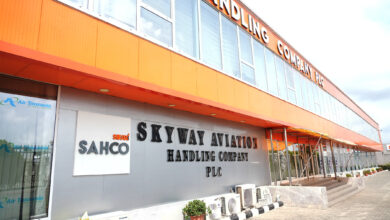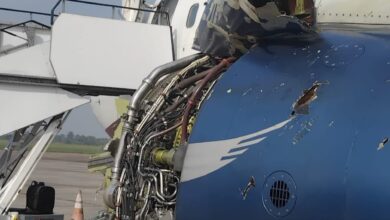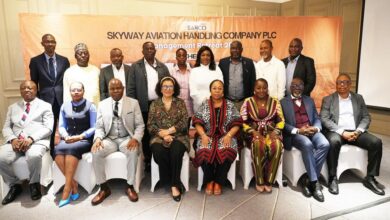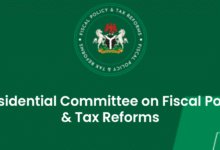
The Minister of Aviation and Aerospace Development, Festus Keyamo, has highlighted the significance of the Nigerian Safety Investigation Bureau (NSIB) in the ongoing reforms of aviation safety in Nigeria.
Keyamo stated this at the NSIB Multimodal Transportation Stakeholders’ Workshop, themed “Strengthening Transport Safety Standards Through Collaboration”, held at the Los Angeles Event Centre in Abuja on Thursday.
Speaking at the event, the Minister, who was the Chief host, emphasised the pivotal role of the Bureau in driving safety reforms across the country.
“Transportation is the lifeblood of any nation’s economy. It connects people, goods, and ideas, driving growth, innovation, and prosperity. In Nigeria, our vast network of airways, railways, waterways, and roadways serves as the backbone of commerce and daily life. However, with this connectivity comes an immense responsibility: ensuring the safety of every passenger, crew member, and cargo.
“Tragically, accidents and incidents in any mode of transport not only claim lives and cause irreparable harm but also erode public confidence and hinder economic progress. This is why today’s Workshop is not just timely but imperative,” he stated.
Minister Keyamo acknowledged the unique challenges within the aviation sector — from air traffic management to aircraft maintenance and weather-related risks. “Yet, safety knows no silos. An incident on a railway can disrupt supply chains that rely on air cargo; a marine casualty can affect inland waterways linked to road transport. This interconnectedness demands a multimodal approach, where collaboration is not optional but essential.
“The NSIB, established under the Nigerian Safety Investigation Bureau (Establishment) Act of 2022, embodies this vision. As an independent body tasked with investigating occurrences across aviation, rail, marine, and road transport, the NSIB ensures that lessons learned from one mode inform safety enhancements in others. The draft Regulations of the various modes of transport, which emphasise prevention over blame, serve as a testament to this holistic strategy.”
Keyamo emphasised that cooperation among stakeholders is the cornerstone of effective safety management, noting that regulators such as the NCAA, NIMASA, NRC, and NIWA must work hand-in-hand with operators, manufacturers, unions, and international partners.
He explained that sharing data on near-misses or contributory factors such as human error, mechanical failures, or environmental conditions can prevent cascading risks across modes, adding that the aviation sector has benefitted significantly from collaborative efforts with ICAO and other global bodies, leading to reduced accident rates.
He stressed the importance of joint initiatives in the rail and marine sectors on infrastructure maintenance and emergency response, urging stakeholders to commit to breaking down barriers, share best practices, invest in joint training programs, and leverage technology such as AI-driven predictive analytics for proactive safety measures.
The Minister also highlighted the importance of timely investigation of occurrences, stressing that delays in probing accidents not only prolong uncertainty for victims’ families but also allow preventable risks to persist.
Speaking further, he said: “The NSIB’s mandate to commence investigations swiftly within seven (7) days for serious incidents ensures that evidence is preserved, witnesses are interviewed promptly, and causal factors are identified without undue hindrance.
“Drawing from global benchmarks, such as those from the U.S. NTSB, timely investigations enable rapid dissemination of preliminary findings, allowing operators to implement interim safeguards. In marine safety, for example, the draft Regulations stress the separation of investigations from judicial proceedings, focusing solely on prevention.
“This independence fosters trust and encourages reporting without fear of reprisal. But investigations alone are insufficient; their actual value lies in the adoption of Safety Recommendations. History teaches us that ignored lessons lead to repeated tragedies. The NSIB’s final reports, which must be published within 12 months for major accidents, provide actionable insights from enhanced crew training to infrastructure upgrades.”
Keyamo urged stakeholders to prioritise these recommendations by integrating them into policies, allocating resources for their implementation, and monitoring compliance.
“In aviation, we have adopted NSIB’s past suggestions on fatigue management and runway safety, yielding tangible improvements. I call on my counterparts in the transportation and marine sectors to do the same. Let us establish inter-ministerial task forces to track and enforce these recommendations, ensuring accountability at every level.”
He mentioned that the path to zero accidents requires unwavering collaboration and teamwork, calling for partnerships that transcend traditional sector boundaries.
“Together, we can build resilient systems: robust air traffic controls, safer railways with advanced signals, secure marine routes with modern navigation aids, and integrated emergency protocols. Our government is committed to supporting NSIB through funding, capacity building, and policy alignment. We envision a Nigeria where every journey is safe, every family reunited, and our economy thrives on the wheels of secure transport,” he added.
He expressed gratitude to the NSIB for providing the platform and expressed optimism that collective efforts will lead to a safer future for all Nigerians.
In his welcome address, the Director-General of the NSIB, Captain Alex Badeh Jr., noted that the workshop’s primary objective was to foster open dialogue, exchange insights, and collectively refine the frameworks that safeguard lives and infrastructure in aviation, maritime, and railway sectors.
Badeh Jr. mentioned that in an era where transportation systems are increasingly interconnected, collaboration is not just beneficial but also essential.
“By working together, we can identify gaps, share best practices, and build resilient safety mechanisms that align with international standards while addressing our unique national challenges.
“During this workshop, we are excited to present and discuss three key regulatory drafts that form the cornerstone of our efforts: First, the Railway (Investigation of Accidents and Incidents) Regulations Draft, which aims to establish robust procedures for probing railway mishaps, ensuring thorough analysis and preventive recommendations to enhance rail safety nationwide.
“Second, the Maritime Safety Investigation Regulations Draft, designed to streamline investigations into maritime accidents and incidents, promoting transparency, accountability, and improved safety protocols in our vital waterways and ports. And third, a comprehensive review of the Revised Civil Aviation (Investigation of Air Accidents and Incidents) Regulations Draft, which builds on existing frameworks to incorporate emerging technologies, global lessons learned, and stakeholder feedback for even stronger aviation safety oversight,” Badeh Jr. disclosed.
He revealed that the drafts represent months of dedicated work by NSIB teams, informed by data, expert consultations, and real-world experiences.
The DG affirmed that the workshop would gather valuable input to refine the drafts further, ensuring they are practical, enforceable, and effective in preventing future incidents.
He expressed confidence that the discussions would yield actionable outcomes and strengthen the collective resolve to prioritise safety.
“Let us embrace this opportunity to collaborate, innovate, and elevate standards for the benefit of all Nigerians,” he further stated.
The event also featured goodwill messages from the Managing Director/CEO of the National Inland Waterways Authority (NIWA), Mr. Bola Oyebamiji; the Managing Director of the Nigerian Railway Corporation (NRC), Dr. Kayode Opeifa; the Director-General/CEO of the Nigerian Maritime Administration and Safety Agency (NIMASA), Dr. Dayo Mobereola; and the former Managing Director of the Nigerian Railway Corporation (NRC), Engr. Seyi Sijuwade.
Other speakers included the former Managing Director of the National Transportation Safety Board (NTSB), United States, Mr. Dennis Jones; Retired Chief of Naval Staff, Vice Admiral Dele Ezeoba; and the Director-General/CEO of the Nigeria Civil Aviation Authority (NCAA), Capt. Chris Najomo.







